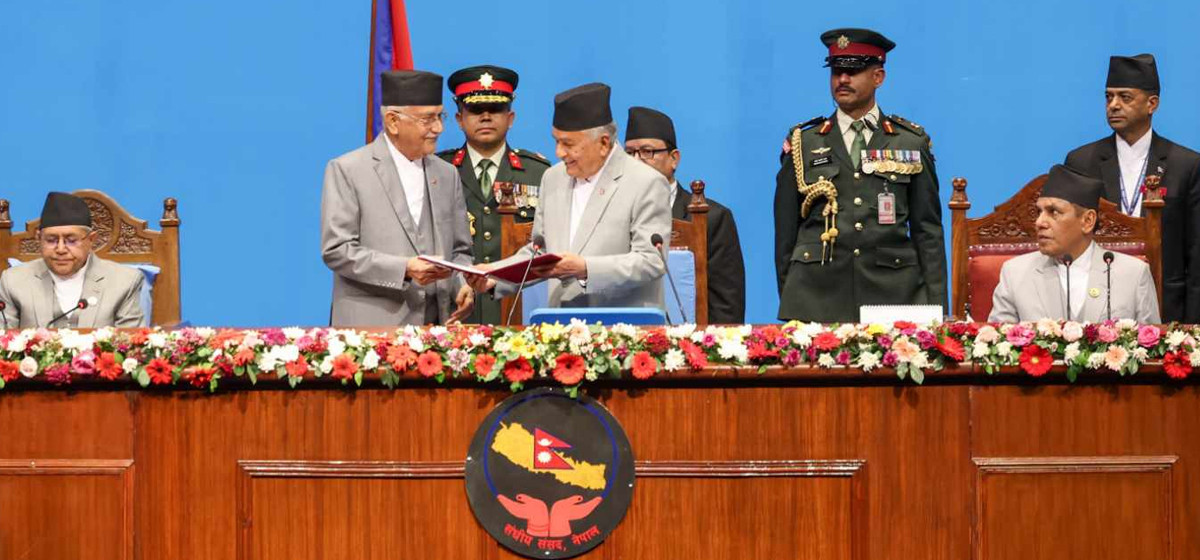New Programs prioritize Education Healthcare and Economic Growth
KATHMANDU, May 3: The government unveiled its policies and programs for Fiscal Year 2025/26 on Friday, with President Ramchandra Paudel presenting the agenda in a joint session of Parliament.
The policy emphasizes good governance, rapid economic growth, and the protection of constitutional achievements. Key priorities include education reform, improved healthcare access, job creation, and strengthening the federal system. The government also pledged to counter misinformation and destabilizing activities targeting the constitution.
Aimed at fulfilling the national vision of “Prosperous Nepal, Happy Nepali,” the programs promote inclusive development, economic reform, and democratic governance. Parliament will debate the policies from May 5 to 9. Speaker Devraj Ghimire urged parties to submit names of participating lawmakers in advance.
The government reaffirmed its commitment to strengthening the federal democratic republic, upholding constitutional achievements, and pursuing consensus-based reforms. It also emphasized political stability, administrative efficiency, and enhanced service delivery through digital transformation. A zero-tolerance policy on corruption and impunity remains a cornerstone.
Local govts intensify preparations for budget, policies and pro...

Economically, the government plans to revitalize growth through high-level reforms, private sector investment, and harmonized fiscal and monetary policies. Structural tax reforms, efficient public spending, and an Alternative Development Finance Fund are part of this strategy.
Education is a top priority, with plans for legal and institutional reforms, modernized curricula, and a greater focus on technical, vocational, and research-based learning. The President Educational Reform Program will be transformed into the National Educational Reform Program, aiming for universal basic education by 2084 BS. Youth-focused startup programs and a “study while working” initiative will help address unemployment and promote entrepreneurship.
In healthcare, access and affordability will be expanded through a restructured health insurance system and integration of fragmented services. Specialized care, traditional medicine, and climate-resilient health infrastructure are also planned.
The agricultural sector will be modernized to enhance food security and self-reliance. The government will promote organic practices, improve insurance coverage, and encourage youth participation. Infrastructure development, including roads, tunnels, and expressways, will support regional connectivity and economic expansion.
Energy development will focus on hydropower, solar, and other renewables. Initiatives include promoting electricity use, reducing fuel imports, and achieving carbon neutrality by 2045. Conservation efforts and climate finance strategies will also be implemented.
Labor policy will prioritize domestic employment, expand social security, and improve vocational training. Reforms in foreign employment aim to make overseas work safer and better regulated.
Tourism will be developed as a key economic sector, with focus on wellness, cultural, and adventure tourism. Aviation sector reforms and heritage conservation will complement this strategy.
Inclusive development remains a priority, with targeted programs for women, children, senior citizens, and marginalized communities to enhance protection, empowerment, and access to services.
To support federalism, coordination among the three tiers of government will be strengthened. The Nagarik App will serve as a central digital platform to streamline service delivery. Administrative and civil service reforms will promote more efficient governance.
Legal and judicial reforms will ensure better access to justice and aim to conclude the transitional justice process. Foreign policy will adhere to non-alignment and balanced diplomacy, while national security will be reinforced through the modernization of the armed forces and defense infrastructure.
The government also plans to reform development practices by reprioritizing infrastructure projects. Feasible projects will be completed within the fiscal year or parliamentary term, while non-viable initiatives will be suspended or canceled.
The education policy outlines 12 key reform areas, including curriculum standardization, promotion of scientific research, improved university governance, and integration of traditional knowledge with modern innovation.





































